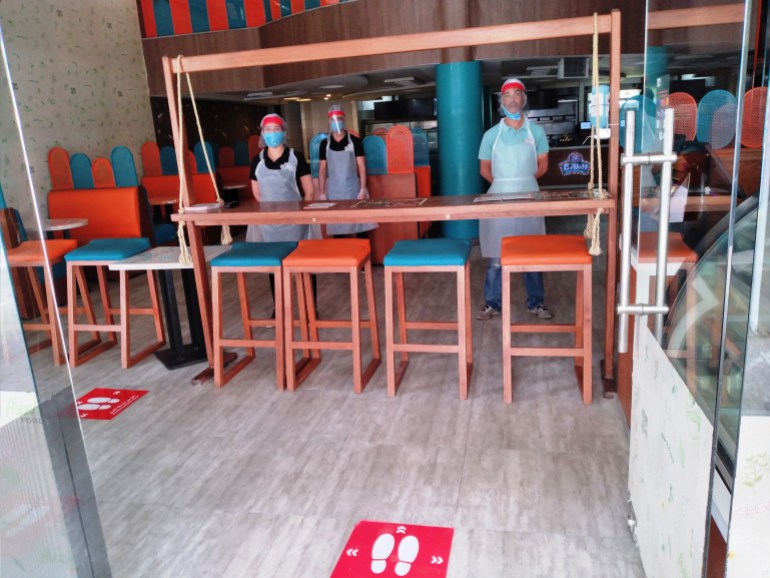Like the rest of the world, the Moroccan economy is experiencing a difficult situation as a result of the impact of the Corona epidemic, and all reports of official and unofficial institutions have shown it.
Due to the quarantine and complete closure that lasted 3 months, a large part of the Moroccan economy has stopped and the repercussions are still in effect, and vital sectors are still unable to recover yet, and others are experiencing a slow resumption of activity.
By giving priority to the health and education sectors, and betting on universal health coverage, will the reform plan proposed by next year's budget succeed in overcoming the exceptional situation and achieving the post-pandemic economic take-off?
An exceptional crisis
Moroccan Minister of Economy, Finance and Administration Reform Mohamed Ben Chaaboun presented figures described as "grim", in a presentation he made last Monday to Parliament regarding the implementation of the 2020 budget and the draft 2021 budget.
The budget was affected by a decline in tax revenues at the end of August to minus 11.5 billion dirhams (1.25 billion dollars) as a result of the epidemic and a two-year succession of drought and losses in vital and strategic sectors such as tourism and transportation, in exchange for an increase in the level of expenditures to cope with the economic and social repercussions of the health crisis related to the Coronavirus, Current expenditures increased by 8.7 billion dirhams.
Macro economic indicators
The Moroccan Economy Minister said that the figures announced so far indicate that the macroeconomic framework will deteriorate, compared with initial expectations or even with the year 2019, due to the impact of the Covid-19 pandemic.
The government official stated that "every day of complete quarantine threatens to lose 10 thousand jobs," and expected unemployment rates by the end of the year to reach record levels of 13%, compared to 9.2% recorded last year.
The budget deficit exceeded 55.5 billion dirhams (about 6 billion dollars), an increase of 25% compared to the previous year.
While the internal output is expected to decrease by 5%.
The current account deficit was minus 8.6%, relative to the gross domestic product, while Treasury debt was 76.1% of the gross domestic product.
The priority is health and education
Morocco intends to increase expenditures related to education and health in the coming year, while reducing other expenditures in light of the expected decrease in tax revenues by about two billion dollars (between 20 and 25 billion dirhams).
Benchaaboun explained that preparing the draft budget for 2021 includes a number of bets, including giving priority to the health and education sectors, as the draft budget promises to allocate 5,500 financial positions in the health sector (an increase of 1,500 positions compared to the year 2020), and 17,000 positions in the education sector (an increase of two thousand Position compared to the same year), and an increase in equipment and investment expenditures in the two sectors, equivalent to an additional 5 billion dirhams increase for the education and health sectors.
Restaurant workers in the capital, Rabat, wear protective masks (Al-Jazeera)
Comprehensive coverage
The government is working to launch the first phase of universal social coverage and reforming the public sector, in accordance with royal instructions.
Among the basic bets of the 2021 budget project, the government promises to work towards universalizing compulsory sickness insurance, approving family compensation for all families, and reviewing the legal framework to ensure the establishment of new compulsory sickness insurance for the benefit of the most needy groups who are currently benefiting from the "Ramid" system, and accelerate health coverage for workers Self-employed and those engaged in private activities and non-wage earners.
The draft budget for 2021 estimates the total cost of activating the universalization of compulsory health coverage, starting next year and over two years, at 13.8 billion dirhams ($ 1.5 billion).
#Morocco Despite the repercussions of the Corona crisis on the state's income, it is expected that the draft Finance Bill 2021 will include an increase of 5 billion dirhams in the budget of the health and education sectors, in order to consecrate their priorities in the government program
- EL OTMANI Saad dine (@Elotmanisaad) September 29, 2020
Balance with the same reform
Commenting on the presentation made by the government regarding the current situation and the 2021 budget, economist Abd al-Nabi Abu al-Arab says that the budget came with the breath of an ambitious reformer.
Abu Al-Arab added - in a statement to Al-Jazeera Net - that the current budget is an austerity budget, in which the state is obligated and obliged to determine expenditures.
For his part, economic analyst Rashid Oraz considers - in an interview with Al Jazeera Net - that the implementation of the 2020 budget shows the size of the epidemic's impact on macroeconomic indicators, and on the infrastructure of basic sectors.
And Oraz puts the new budget within the policy of austerity and rationalization of expenditures, especially in a situation of crisis likely to continue.
Abu Al-Arab also describes the reforms pursued as harsh, and considers them a break with the institutional welfare that does not affect the citizen, and the return to utilitarianism through expenditures that contribute to achieving security and protect against the risk of institutional fragility.
He believes that giving priority to health, education and social coverage is a kind of awareness of the necessity of managing and reorienting expenditures, and said, "This is the bet, and it is dictated by the duty of the moment."
While Rachid Oraz believes that adopting a reform that devotes universal social coverage is an ambitious program, the available financial capabilities make its actual realization difficult, and it requires time and resources besides the will.

